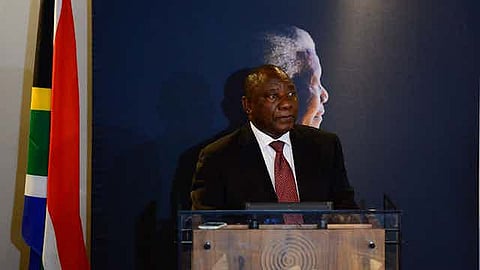What would Mandela do? A hard leader for hard times: Jonny Steinberg
Key topics:
Ramaphosa often invokes Mandela, but misrepresents his leadership style
Mandela was a tough, decisive leader who didn’t hesitate to confront dissent
In today's crisis, Mandela would act boldly, not resort to weak inquiries
Sign up for your early morning brew of the BizNews Insider to keep you up to speed with the content that matters. The newsletter will land in your inbox at 5:30am weekdays. Register here.
Support South Africa’s bastion of independent journalism, offering balanced insights on investments, business, and the political economy, by joining BizNews Premium. Register here.
If you prefer WhatsApp for updates, sign up to the BizNews channel here.
The auditorium doors will open for BNIC#2 on 10 September 2025 in Hermanus. For more information and tickets, click here.
By Jonny Steinberg*
In 2023 South African author Jonny Steinberg published a book on former South African president Nelson Mandela and his tumultuous marriage to Winnie Madikizela-Mandela. To mark the 107th anniversary of Mandela’s birth, Steinberg wrote the following as an introduction to our newsletter of 18 July 2025.
As Nelson Mandela’s birthday approaches, I find that without any conscious bidding my mind has embarked on a thought experiment: If Mandela were in Cyril Ramaphosa’s shoes now, if he were president of South Africa facing a truly shocking crisis in the criminal justice system, what would he do?
It’s a silly experiment, I know, both because he isn’t here, and because people, especially unusual people like Nelson Mandela, tend to surprise you.
But I can’t help it, and it is partly Ramaphosa’s fault. He is forever invoking Mandela’s name, forever claiming to channel his spirit. Mandela, he says ad nauseum, was the world’s great consensus builder; his ship would not sail until all had consented to board.
Read more:
This could not be further from the truth. Mandela was a patrician leader, at times even a draconian leader, who steamrolled dissent when he thought it necessary. And he led at a time when it was necessary. During the transition to democracy, he ended the armed struggle in the face of fierce opposition from across the democratic movement. He abandoned nationalisation when the trade union movement and South African Communist Party screamed that he had sold out. He went into these battles fiercely. He was rude, arrogant, insulting. He interrupted people when they were speaking. He was a hard man who played a hard game; he’d been like that all his life.
I would hazard a guess that in the midst of the crisis Ramaphosa is facing, Mandela’s most patrician qualities would have come out. He’d be firing people. He’d be insulting them in public speeches. He would put on that forbidding face of his, his lips in a downturned grimace.
Would it have worked? He managed to drag a volatile movement through a nightmarishly difficult transition to democracy. Could he have dragged it out of the quagmire of criminalisation and violence it finds itself in now? Who knows? What’s left of the African National Congress may be too far gone for that. What he would not do, I am sure, is tepidly announce yet another commission of inquiry.
*Jonny Steinberg Senior lecturer in African Studies, Yale University
This article was first published by The Conversation and is republished with permission

